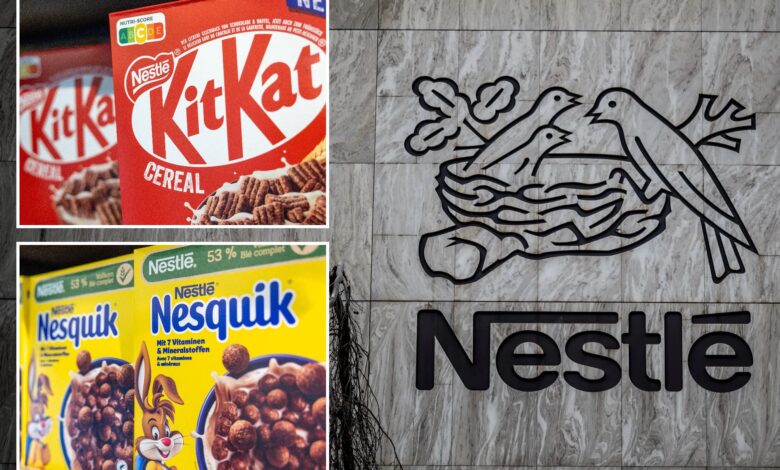Nestlé growth slows as inflation eats away at profits

Nestlé saw its stock price fall by nearly 4.5% on Thursday after the Swiss multinational maker of KitKat chocolate bars and Häagen-Dazs ice cream reported growth figures that missed estimates — another sign that inflation is eating into the company’s bottom line.
The firm said it expects organic sales growth of around 4% in 2024, and a “moderate increase” in its underlying trading operating profit margin.
Organic sales, which exclude the impact of currency movements and acquisitions, rose 7.2% in the year ended Dec. 31, the company said.
Analysts had on average expected organic sales growth of 7.4%.
Nestlé’s full-year sales fell by 1.5% to about $105.54 billion, missing estimates of $106.32 billion.
Its full-year 7.5% price increases met the average analyst estimate.
Real internal growth — or sales volumes — for the period fell 0.3% versus expectations of a 0.1% decline.
Sales volumes in the fourth quarter turned positive, rising 0.4%.
“Nestle finishes the year on a disappointing note,” Bernstein analyst Bruno Monteyne said.
“Guidance for 2024 organic growth of 4.0% is below current consensus of 4.9% and guidance for a moderate margin increase may put pressure on the current (margin) consensus of 17.7%.”
However, Nestlé’s net profit rose sharply by about 20% to $12.76 billion.
Nestlé’s rival, French food conglomerate Danone, saw its shares rise after reporting strong sales numbers.
The world’s largest yogurt maker whose brands include Evian and Badoit water reported $29.84 billion in sales last year — a 7% increase year over year.
The operating margin for full year 2023 rose to 12.6% of sales from 12.2% in 2022, compared with average analysts’ estimates of 12.5%.
For the fourth quarter ended Dec. 31, sales grew 5.1%, slightly above market estimates of 5%, with contributions from all its three businesses – EDP, Specialized Nutrition and Waters.
Danone, like its rivals Nestlé and Unilever, has increased prices to cope with higher commodities and supply chain costs.
Ghana’s government said that the country’s cocoa output is expected to be almost 40% below a target of 820,000 metric tons.
Strong seasonal winds and a lack of rain are among the main factors behind the shortfall, along with smuggling, damage caused by illegal gold mining, and swollen shoot disease.
Ghana’s production shortfall and similar deficits in Ivory Coast have been fueling historic surges in global cocoa prices, as traders scramble for supplies, predicting ever wider deficits this season and with concerns growing for the next.
On Thursday, London cocoa futures on ICE surged past the psychological 5,000 pound barrier while New York cocoa breached the $6,000 mark.
With Post Wires




